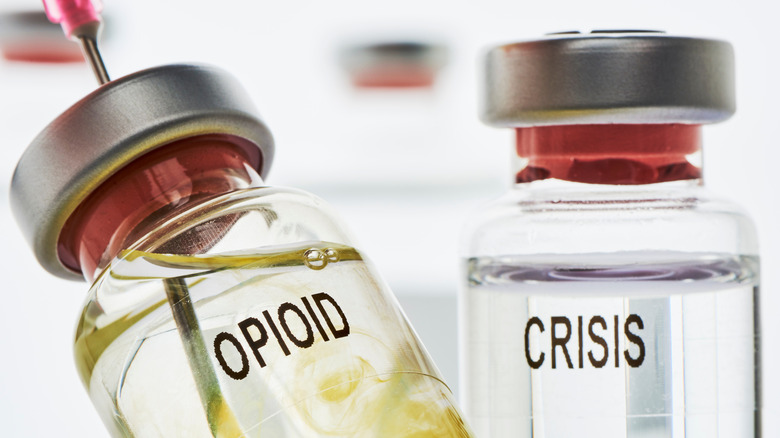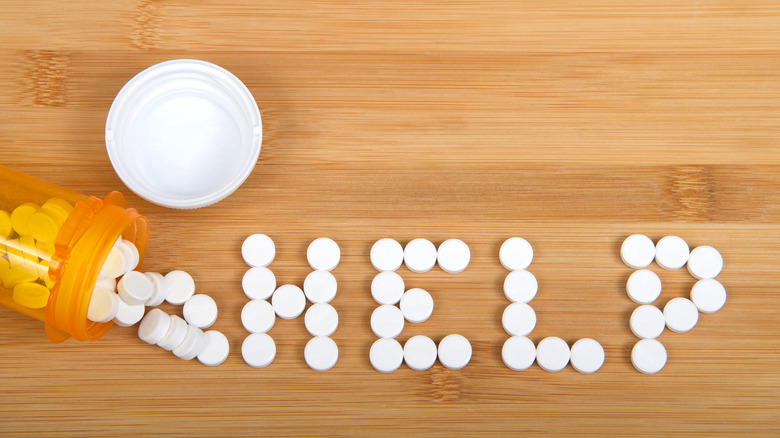The Real Reason COVID-19 Has Been So Concerning For The Opioid Epidemic
In addition to the physical toll taken by COVID-19, it's been wreaking havoc on everyone's mental health. Frontline workers may have borne the brunt of the stress, but even the fortunate ones who worked from home and didn't have friends or family members seriously ill with the virus still experienced an unprecedented interruption in life as we once knew it. Worries and fears caused problems with sleeping, problems with eating, and, in the long term, they may even accelerate our aging.
Although we all tried to make light of our quarantine boredom by adopting goofy trends and posting funny videos, there was a darker side to all of that. Our newfound obsession with food may have exacerbated eating disorders, and all those earlier and earlier happy hours masked a dangerous dependence on alcohol. One trend, however, that was just too dark to be deemed meme-worthy was the fact that more and more people may have been turning to opioids, so much so that in December 2020 the CDC issued a Health Alert Network (HAN) Advisory about the "concerning acceleration of the increase in drug overdose deaths." Why would the opioid epidemic be getting so much worse at a time when we've got a pandemic to deal with as well? Dr. Todd Dickson, DNP, a faculty member for Walden's Master of Science in Nursing program, has over a quarter-century's experience in treating substance abuse, and he spoke with The List about how COVID-19 is making a bad situation so much worse.
Opioid abuse has soared during the pandemic
Dickson shared with us some scary stats regarding increasing opioid use over the past year, saying recent CDC data indicates that over 90,000 people in the U.S. fatally overdosed between September 2019 and September 2020, a 34 percent increase in opioid fatalities and a high-water mark for the opioid epidemic.
That's not all the bad news, though. As Dickson points out, "People with opioid use disorder are often more vulnerable to contracting COVID-19," explaining that this is due to the fact that "they are more likely to be homeless, be poor, have a co-occurring tobacco use disorder with lung or cardiovascular disease, or be uninsured or underinsured." Many opioid users also have co-occurring mental health issues that have been exacerbated by the pandemic. "For instance," says Dickson, "due to the stay-at-home orders and the need for social distancing, individuals may experience increased feelings of isolation, depression and anxiety of the unknown." He also feels it's likely that these same symptoms may lead to people who weren't previously abusing opioids to turn to these substances to help them cope.
Treatment is harder to come by during the pandemic
It's kind of a Catch-22 situation, in that the pandemic is creating more opioid users than ever at a time when there are fewer and fewer options for treatment available to them. Dickson explains that "Facilities found it challenging to perform services that require close contact," and admits that this led to a reduction in the number of services being offered due to staffing shortages. He also thinks it likely that some clients or potential clients of those treatment centers may themselves have feared the possibility of infection if they left the house to seek those services.
One particular challenge faced by providers of substance abuse treatment is that, as Dickson reveals, "many individuals with opioid use disorder may not have phones or may have limited minutes available, and they may have limited internet services or access to technology such as computers." In such circumstances, it's a challenge to maintain patient engagement at the best of times, and no-one could call these times anything but challenging (or the clichéd "unprecedented") for everyone. Opioid users, however, may be some of those most at risk of the fallout from such a public health emergency, and, tragically, the ones least able to seek out the help they need.
If you, or anyone you know, is struggling with addiction issues, help is available. Visit the Substance Abuse and Mental Health Services Administration (SAMHSA) website or contact SAMHSA's National Helpline at 1-800-662-HELP (4357).


